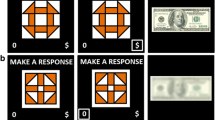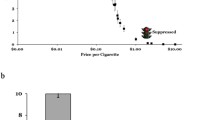Abstract
Rationale
Acute nicotine abstinence is associated with disruption of executive function and reward processes; however, the neurobiological basis of these effects has not been fully elucidated.
Methods
The effects of nicotine abstinence on brain function during reward-based probabilistic decision making were preliminarily investigated by scanning adult smokers (n = 13) following 24 h of smoking abstinence and in a smoking-satiated condition. During fMRI scanning, participants completed the wheel of fortune task (Ernst et al. in Neuropsychologia 42:1585–1597, 2004), a decision-making task with probabilistic monetary outcomes. Brain activation was modeled during selection of options, anticipation of outcomes, and outcome feedback.
Results
During choice selection, reaction times were slower, and there was greater neural activation in the postcentral gyrus, insula, and frontal and parietal cortices in the abstinent condition compared to the satiated condition. During reward anticipation, greater activation was observed in the frontal pole, insula, and paracingulate cortex in the abstinent condition compared to the satiated condition. Greater activation was also shown in the precentral gyrus and putamen in the satiated condition compared to the abstinent condition. During the outcome phase, rewards (compared to no rewards) resulted in significant activation in the paracingulate cortex in the satiated condition compared to the abstinent condition.
Conclusions
The results of this preliminary study suggest that smoking withdrawal results in greater recruitment of insular, frontal, and parietal cortical areas during probabilistic decision making.





Similar content being viewed by others
References
Baker F, Johnson MW, Bickel WK (2003) Delay discounting in current and never-before cigarette smokers: similarities and differences across commodity, sign, and magnitude. J Abnorm Psychol 112:382–392
Barry D, Petry NM (2008) Predictors of decision-making on the Iowa Gambling Task: independent effects of lifetime history of substance use disorders and performance on the Trail Making Test. Brain Cogn 66:243–252
Bechara A (2003) Risky business: emotion, decision-making, and addiction. J Gambl Stud 19:23–51
Beck A, Schlagenhauf F, Wustenberg T, Hein J, Kienast T, Kahnt T, Schmack K, Hagele C, Knutson B, Heinz A et al (2009) Ventral striatal activation during reward anticipation correlates with impulsivity in alcoholics. Biol Psychiatry 66:734–742
Bickel WK, Odum AL, Madden GJ (1999) Impulsivity and cigarette smoking: delay discounting in current, never, and ex-smokers. Psychopharmacology 146:447–454
Bickel WK, Yi R, Kowal BR, Gatchalian KM (2008) Cigarette smokers discount past and future rewards symmetrically and more than controls: is discounting a measure of impulsivity? Drug Alcohol Depend 96:256–262
Binder JR, Medler DA, Desai R, Conant LL, Liebenthal E (2005) Some neurophysiological constraints on models of word naming. Neuroimage 27:677–693
Bolla KI, Eldreth DA, London ED, Kiehl KA, Mouratidis M, Contoreggi C, Matochik JA, Kurian V, Cadet JL, Kimes AS et al (2003) Orbitofrontal cortex dysfunction in abstinent cocaine abusers performing a decision-making task. Neuroimage 19:1085–1094
Brody AL, Mandelkern MA, London ED, Childress AR, Lee GS, Bota RG, Ho ML, Saxena S, Baxter LR, Madsen D et al (2002) Brain metabolic changes during cigarette craving. Arch Gen Psychiatry 59:1162–1172
Buhler M, Vollstadt-Klein S, Kobiella A, Budde H, Reed LJ, Braus DF, Buchel C, Smolka MN (2010) Nicotine dependence is characterized by disordered reward processing in a network driving motivation. Biol Psychiatry 67:745–752
Businelle MS, Kendzor DE, Rash CJ, Patterson SM, Coffey SF, Copeland AL (2009) Heavy smokers perform more poorly than nonsmokers on a simulated task of gambling. Subst Use Misuse 44:905–914
de Ruiter MB, Veltman DJ, Goudriaan AE, Oosterlaan J, Sjoerds Z, van den Brink W (2009) Response perseveration and ventral prefrontal sensitivity to reward and punishment in male problem gamblers and smokers. Neuropsychopharmacology 34:1027–1038
Dichter GS, Felder JN, Petty C, Bizzell J, Ernst M, Smoski MJ (2009) The effects of psychotherapy on neural responses to rewards in major depression. Biol Psychiatry 66:886–897
Engelmann JB, Tamir D (2009) Individual differences in risk preference predict neural responses during financial decision-making. Brain Res 1290:28–51
Epping-Jordan MP, Watkins SS, Koob GF, Markou A (1998) Dramatic decreases in brain reward function during nicotine withdrawal. Nature 393:76–79
Ernst M, Nelson EE, McClure EB, Monk CS, Munson S, Eshel N, Zarahn E, Leibenluft E, Zametkin A, Towbin K et al (2004) Choice selection and reward anticipation: an fMRI study. Neuropsychologia 42:1585–1597
Field M, Santarcangelo M, Sumnall H, Goudie A, Cole J (2006) Delay discounting and the behavioural economics of cigarette purchases in smokers: the effects of nicotine deprivation. Psychopharmacology 186:255–263
Ghahremani DG, Monterosso J, Jentsch JD, Bilder RM, Poldrack RA (2010) Neural components underlying behavioral flexibility in human reversal learning. Cereb Cortex 20:1843–1852
Gilbert DG, McClernon FJ, Rabinovich NE, Dibb WD, Plath LC, Hiyane S, Jensen RA, Meliska CJ, Estes SL, Gehlbach BA (1999) EEG, physiology, and task-related mood fail to resolve across 31 days of smoking abstinence: relations to depressive traits, nicotine exposure, and dependence. Exp Clin Psychopharmacol 7:427–443
Gilbert D, McClernon J, Rabinovich N, Sugai C, Plath L, Asgaard G, Zuo Y, Huggenvik J, Botros N (2004) Effects of quitting smoking on EEG activation and attention last for more than 31 days and are more severe with stress, dependence, DRD2 A1 allele, and depressive traits. Nicotine Tob Res 6:249–267
Harmsen H, Bischof G, Brooks A, Hohagen F, Rumpf HJ (2006) The relationship between impaired decision-making, sensation seeking and readiness to change in cigarette smokers. Addict Behav 31:581–592
Hendricks PS, Ditre JW, Drobes DJ, Brandon TH (2006) The early time course of smoking withdrawal effects. Psychopharmacology 187:385–396
Jacobsen LK, Mencl WE, Constable RT, Westerveld M, Pugh KR (2007) Impact of smoking abstinence on working memory neurocircuitry in adolescent daily tobacco smokers. Psychopharmacology 193:557–566
Koob GF (2009) Neurobiological substrates for the dark side of compulsivity in addiction. Neuropharmacology 56:18–31
Koob GE, Le Moal M (2008) Addiction and the brain antireward system. Annu Rev Psychol 59:29–53
Kozink RV, Lutz AM, Rose JE, Froeliger B, McClernon FJ (2010) Smoking withdrawal shifts the spatiotemporal dynamics of neurocognition. Addict Biol 15:480–490
Lawrence NS, Ross TJ, Stein EA (2002) Cognitive mechanisms of nicotine on visual attention. Neuron 36:539–548
Lejuez CW, Aklin WM, Jones HA, Richards JB, Strong DR, Kahler CW, Read JP (2003) The Balloon Analogue Risk Task (BART) differentiates smokers and nonsmokers. Exp Clin Psychopharmacol 11:26–33
Liu X, Powell DK, Wang H, Gold BT, Corbly CR, Joseph JE (2007) Functional dissociation in frontal and striatal areas for processing of positive and negative reward information. J Neurosci 27:4587–4597
Loughead J, Ray R, Wileyto EP, Ruparel K, Sanborn P, Siegel S, Gur RC, Lerman C (2010) Effects of the alpha4beta2 partial agonist varenicline on brain activity and working memory in abstinent smokers. Biol Psychiatry 67:715–721
Martin-Soelch C, Missimer J, Leenders KL, Schultz W (2003) Neural activity related to the processing of increasing monetary reward in smokers and nonsmokers. Eur J Neurosci 18:680–688
McClernon FJ, Kollins SH, Lutz AM, Fitzgerald DP, Murray DW, Redman C, Rose JE (2008) Effects of smoking abstinence on adult smokers with and without attention deficit hyperactivity disorder: results of a preliminary study. Psychopharmacology 197:95–105
Mendrek A, Monterosso J, Simon SL, Jarvik M, Brody A, Olmstead R, Domier CP, Cohen MS, Ernst M, London ED (2006) Working memory in cigarette smokers: comparison to non-smokers and effects of abstinence. Addict Behav 31:833–844
Mitchell SH (2004) Effects of short-term nicotine deprivation on decision-making: delay, uncertainty and effort discounting. Nicotine Tob Res 6:819–828
Myers CS, Taylor RC, Moolchan ET, Heishman SJ (2008) Dose-related enhancement of mood and cognition in smokers administered nicotine nasal spray. Neuropsychopharmacology 33:588–598
Naqvi NH, Bechara A (2009) The hidden island of addiction: the insula. Trends Neurosci 32:56–67
Naqvi NH, Rudrauf D, Damasio H, Bechara A (2007) Damage to the insula disrupts addiction to cigarette smoking. Science 315:531–534
Ohmura Y, Takahashi T, Kitamura N (2005) Discounting delayed and probabilistic monetary gains and losses by smokers of cigarettes. Psychopharmacology 182:508–515
Parrott AC, Garnham NJ, Wesnes K, Pincock C (1996) Cigarette smoking and abstinence: comparative effects upon cognitive task performance and mood state over 24 hours. Hum Psychopharmacol 11:391–400
Patterson F, Jepson C, Loughead J, Perkins K, Strasser AA, Siegel S, Frey J, Gur R, Lerman C (2010) Working memory deficits predict short-term smoking resumption following brief abstinence. Drug Alcohol Depend 106:61–64
Pettiford J, Kozink RV, Lutz AM, Kollins SH, Rose JE, McClernon FJ (2007) Increases in impulsivity following smoking abstinence are related to baseline nicotine intake and boredom susceptibility. Addict Behav 32:2351–2357
Powell J, Dawkins L, Davis RE (2002) Smoking, reward responsiveness, and response inhibition: tests of an incentive motivational model. Biol Psychiatry 51:151–163
Rogers RD, Ramnani N, Mackay C, Wilson JL, Jezzard P, Carter CS, Smith SM (2004) Distinct portions of anterior cingulate cortex and medial prefrontal cortex are activated by reward processing in separable phases of decision-making cognition. Biol Psychiatry 55:594–602
Rolls ET (2000) The orbitofrontal cortex and reward. Cereb Cortex 10:284–294
Rotheram-Fuller E, Shoptaw S, Berman SM, London ED (2004) Impaired performance in a test of decision-making by opiate-dependent tobacco smokers. Drug Alcohol Depend 73:79–86
Schoenbaum G, Setlow B, Nugent SL, Saddoris MP, Gallagher M (2003a) Lesions of orbitofrontal cortex and basolateral amygdala complex disrupt acquisition of odor-guided discriminations and reversals. Learn Mem 10:129–140
Schoenbaum G, Setlow B, Ramus SJ (2003b) A systems approach to orbitofrontal cortex function: recordings in rat orbitofrontal cortex reveal interactions with different learning systems. Behav Brain Res 146:19–29
Schoenbaum G, Roesch MR, Stalnaker TA (2006) Orbitofrontal cortex, decision-making and drug addiction. Trends Neurosci 29:116–124
Shiffman SM, Jarvik ME (1976) Smoking withdrawal symptoms in two weeks of abstinence. Psychopharmacology 50:35–39
Shiffman S, Paty JA, Gnys M, Elash C, Kassel JD (1995) Nicotine withdrawal in chippers and regular smokers—subjective and cognitive effects. Health Psychol 14:301–309
Smith BW, Mitchell DGV, Hardin MG, Jazbec S, Fridberg D, Blair RJR, Ernst M (2009) Neural substrates of reward magnitude, probability, and risk during a wheel of fortune decision-making task. Neuroimage 44:600–609
Snyder FR, Davis FC, Henningfield JE (1989) The tobacco withdrawal syndrome: performance decrements assessed on a computerized test battery. Drug Alcohol Depend 23:259–266
Sweet LH, Mulligan RC, Finnerty CE, Jerskey BA, David SP, Cohen RA, Niaura RS (2010) Effects of nicotine withdrawal on verbal working memory and associated brain response. Psychiatry Res 183:69–74
Ward BD (2000) Simultaneous inference for fMRI data. Available at http://homepage.usask.ca/~ges125/fMRI/AFNIdoc/AlphaSim.pdf
Xu J, Mendrek A, Cohen MS, Monterosso J, Rodriguez P, Simon SL, Brody A, Jarvik M, Domier CP, Olmstead R et al (2005) Brain activity in cigarette smokers performing a working memory task: effect of smoking abstinence. Biol Psychiatry 58:143–150
Xue G, Lu Z, Levin IP, Bechara A (2010) The impact of prior risk experiences on subsequent risky decision-making: the role of the insula. Neuroimage 50:709–716
Yarkoni T, Barch DM, Gray JR, Conturo TE, Braver TS (2009) BOLD correlates of trial-by-trial reaction time variability in gray and white matter: a multi-study fMRI analysis. Plos One 4:e4257
Acknowledgements
We thank Avery Lutz for her assistance with data acquisition. This research was supported by NIDA grants K23DA017261 and R01 DA023516 to FJM, R03 MH078145 and K23 MH081285 to GSD, and K23 MH087754 to MJS.
Disclosure/conflict of interest
Dr. Addicott, Mr. Baranger, Ms. Kozink, Dr. Smoski, and Dr. Dichter report no conflicts of interest. Dr. McClernon has received research funding from the National Institute on Drug Abuse, the Atkins Foundation, and an unrestricted grant from Philip Morris USA to Duke University (Dr. Jed E. Rose, PI).
Author information
Authors and Affiliations
Corresponding author
Additional information
An erratum to this article can be found at http://dx.doi.org/10.1007/s00213-011-2531-x
Rights and permissions
About this article
Cite this article
Addicott, M.A., Baranger, D.A.A., Kozink, R.V. et al. Smoking withdrawal is associated with increases in brain activation during decision making and reward anticipation: a preliminary study. Psychopharmacology 219, 563–573 (2012). https://doi.org/10.1007/s00213-011-2404-3
Received:
Accepted:
Published:
Issue Date:
DOI: https://doi.org/10.1007/s00213-011-2404-3




